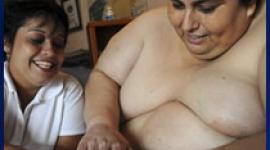Talking to Your Teen About Eating Disorders: Mother and Daughter
Did You Eat Anything?: A Drama
Caryn is very concerned about her daughter, Brooke, who looks too thin to her. She feels that Brooke may have gone too far with her diet.
Caryn: Did you eat anything?
Brooke: I had a half a bagel.
Caryn: Did you put anything on it?
Brooke: Mom, who are you? The Food Nazi?
Caryn: I never see you eat anymore. You're getting so skinny.
Brooke: Well, who told me I was fat in the first place?
Caryn: I said that you should exercise. I said that you should exercise with me. That we could go to the gym together.
Brooke: You said that I was heavy. And that I should stop eating junk. We went to McDonalds and you said that I should order the broiled chicken. When we went for pizza, you said that one piece was enough for me. You thought I was fat.
Caryn: Don't be ridiculous.
Brooke: Admit it, Mom. You told me to go on a diet. So I did. And now you don't like it. Funny. You didn't like me fat and now you don't like me skinny. I can't win with you.
Caryn: Of course I love you. I love you any way you are. I just don't want kids to make fun of you. You told me they were.
Brooke: Well they're not anymore.
Caryn: I'm glad about that.
 Brooke: Do you think I look good?
Brooke: Do you think I look good?
Caryn: You look too thin.
Brooke: I don't think so.
Caryn: Your father told me that when you were there this weekend all you ate was a salad.
Brooke: Please, I went out with friends.
Caryn: You've got to eat, honey.
Brooke: Who are you to talk? You're always on a diet. The refrigerator is filled with Slim Fast. Or you just eat steak and eggs all week. You're the one who is obsessed with food. Not me.
Caryn: Sweetie, of course I watch my weight.
Brooke: You spend half of your time at the gym. You never like the way you look. Ever.
Caryn: Brooke, I try my best. I'm not perfect.
Brooke: Neither am I. So just stop bothering me. Believe me, I'm not going to starve myself to death.
Caryn: I'm worried about you. Aren't you tired?
Brooke: No ,Mom. I feel fine. I'm not that thin.
Caryn: You are. You don't see yourself. You're disappearing. You're practically nothing.
Brooke: I feel fine.
Caryn: Are you getting your period?
Brooke: Mom, don't worry about me.
Caryn: I think I've messed things up here. I've been so worried about my own weight that I've given you the wrong message. Brooke, it's time to start eating normally . To be healthy.
Brooke: Mom, you're jealous. Because I've succeeded. And you just go up and down.
Caryn: Don't be ridiculous!! I've made peace with my weight. I'm always going to have to watch what I eat.
Brooke: Well so do I.
Caryn: You're watching too much. I'm making an appointment with a nutritionist for you. Today. You have to learn to eat better. You don't have to look like Calista Flockhart.
Brooke: Don't make the appointment. I'm not going to go.
Therapist's Comments on Eating Disorders
This is a classic example of a conversation between Mother and daughter who want to connect, yet lack the skills to communicate. The Mother is clearly concerned about her daughter's well being. She is attempting to convey the message that she cares. The daughter, on her part, is expressing her anger, yet at the same time indicating a need for the Mother's approval.
Each is attempting to reach out, yet neither side knows how to connect. The overall experience is one of frustration and distance.
The Mother begins by focusing on the food. Through the food she is expressing her concern for the daughter's well being. The daughter, Brooke, instead hears her Mother's comments as critical and attacks in return. Brooke feels locked in, backed into a corner. She can never get her Mother's approval - she is either too thin or too fat.
Brooke hints at her need for approval/acceptance by asking "Do you think I look good?" The Mother, feeling parental concern and the need to set limits responds, "You look too thin." Brooke, once again, feels criticized and just 'not good enough'.
By the end of the conversation, the Mother has journeyed from being the "Interrogator" to the "Martyr" to the "Authoritarian", who comes down hard. The daughter retreats and resorts to her role of being negative and rejecting.
As the parent of an adolescent with an Eating Disorder, it is important to recognize that food is a symptom, a smoke screen for other issues. Often the teenager is feeling confused, insecure and out of control. Unable to express these concerns directly, she turns to food.
Attempting to change her eating habits directly usually ends up in a power/control struggle. Instead, try strengthening other aspects in the relationship. Let her know that she means more to you than what she does or does not eat. The road to eating disorder recovery is often a long and difficult one and eating disorder treatment is a must. Stay focused on small and positive gains. There is hope for the future.
next: Teenagers with Eating Disorders
~ eating disorders library
~ all articles on eating disorders
APA Reference
Staff, H.
(2009, January 7). Talking to Your Teen About Eating Disorders: Mother and Daughter, HealthyPlace. Retrieved
on 2025, December 7 from https://www.healthyplace.com/eating-disorders/articles/talking-to-your-teen-about-eating-disorders-mother-and-daughter



